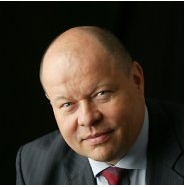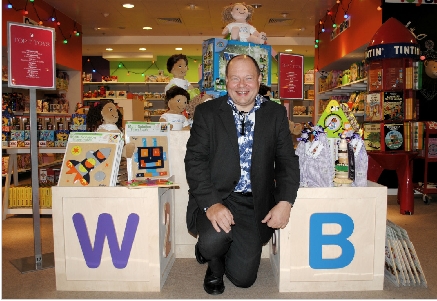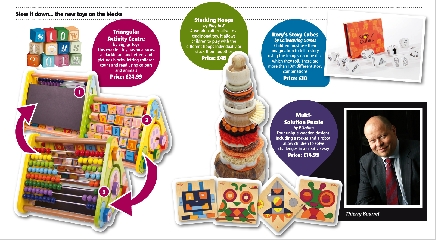
How did you come up with the Slow Toy concept? What inspired you?
I’ve got a strong feeling about what I would call the ‘slow toy’. It’s a concept that was introduced to me when I went to France and met a lady called Catherine Taniere from Shokid.
She said to me, ‘have you heard of the concept of ‘slow toy’?’, she explained to me about the Italian chef who started the Slow Food movement (Carlo Petrini), because he was against fast food.
When I saw Doggie Doo in Dream Toys I was not happy, so I wrote a blog about it which was picked up by [the toy trade press] and the Telegraph. So we started the Slow Toy Awards last year.
What is it about Doggie Doo that you gets you so worked up?
You know… it’s a dog that shits. Whichever way you put it, that’s what it is. Is it really a toy?
Also it’s the wording in the [Dream Toys] release, which claimed that 12 toys were at the height of sophistication – or rather, innovation. What’s innovative about it?
Maybe, far and away, possibly. I just don’t think its what’s innovative in the toy industry… we’ve got so much more innovative stuff.
But anyway, I’ve got a bee in my bonnet about awards.
So what it is about toy awards that bothers you?
Well I will say that at least in Dream Toys you don’t have to pay to be one of the 12 toys. But the toy awards that really wind me up? Those which send you an email asking you to pay and three samples of each toy you enter. This is wrong.
There’s so many of those now and [Asobi] do not enter any of these.
Slow Toys coverage:
> Slow Toy Award winners star at Selfridges
> IN PICTURES: Slow Toy Award winners 2012
Of course the Slow Toy Awards is free to enter…
It is free. And I understand that the Slow Toy is not for everybody.
I’ve had discussions with people who wanted me to change the name to ‘Real Toy’ or something like that.
The two criticisms I’ve had – and everybody likes the idea, a lot of people who bothered to speak to me do love the idea – the problem the have is the name ‘Slow Toy’.
One, they think it makes it sound like the industry is running at a slow pace. Or, slow as in a toy which isn’t selling fast. Or slow as in mentally challenged people being labelled as ‘slow’.
The Slow Food movement is a well-known thing, so why not Slow Toy?
I like the idea of the Slow Toy Movement. It’s for real toys and I don’t really want to change name.
Bourret with the seven winners of the Slow Toy Awards (click to expand).

The Slow Toy Awards is at Selfridges this year – the day before Dream Toys – are you setting it up as a rival?
No. We’re not interested in that. It’s a different toy category – we’re not trying to go against them.
Would it be fair to say you set it up as an antidote to Dream Toys?
It is the antidote to Dream Toys, but there is a market for everybody.
But in Dream Toys’ defence – is it not fair to say that kids want brands and the Dream Dozen simply reflects that?
They do want brands, but they want brands because they watch television and brands have the money to advertise on television.
If I had the money to advertise my Calafant cardboard Castle on television that would be a brand of five or ten times what I’m selling at the moment, because it’s a great product. But I don’t have the advertising budget.
From a very early age kids are put in front of the TV, because the TV is a nanny. Although I’m not against that - I use television to relax. But it doesn’t leave much to imagination. A book gives so much more. But kids don’t want to read anymore, it’s like an effort. All the free time they have is spent either in front of the TV or playing things that do not leave anything to the imagination. Nothing creative – so where are the creators of tomorrow going to come from if all kids are like this?
Are there any toys on last year’s Dream Dozen that you respect? What about the LeapPad, for example?
The LeapPad is a great product but Slow Toys is not about twenty differnet fucntions. It’s about leaving plenty to the imagination.
Bourret's Slow Toy Awards was featured as a double page spread in the London Metro.

What about Asobi… you’re still a relatively new toy company – how’s business?
I started in February 2009 and last year in November I had same turnover in one month as I did in my whole first year.
We are up, we had an excellent January and February. March was okay, April was shocking. But since then we’ve really done well. If I compare July this year to July last year, we’re about 30 per cent.
Sounds like it’s going well.
It is going really well. But I could not have done it if I had not sold some of the shares in Asobi. The bank was no where near ready to lend me any money.
My business partner is in the gift industry and his name is Chris Voisey from Junction Eighteen – a large gift distributor in the UK and Ireland with a turnover of about £5 or £6 million.
I use his distribution centre, so we’re a lot more efficient when it comes to shipping. It has reduced my fixed costs because I’ve got an office in his office, and the rest of the time I work from home or visit customers. So we’ve really turned the costs down on everything.
It means that now we are extremely cost-efficient, and with his buying power we’ve managed to cut out transport costs too. Even on containers – I’m paying not far from half of what I was before, because of his buying power. When you’re buy seven containers from China it makes a big difference when those costs have halved.
Is it hard to stick to your principles in the current economic climate?
I’ll be honest with you, when I started Asobi I was really set on eco-friendly and that was it for me. That was what I was born to do.
Then the recession happened. After that it was clear that people looked eco-friendly stuff and said ‘this is great, but it’s really expensive compared to normal toys, so I’ll buy something cheaper’.
You’re not selling out, are you Thierry?
[Laughs] I have to eat. And as you can see I eat well.
But I don’t think I’m the only one. Maybe in my early ways I was a little bit idealistic. But no matter how eco-friendly you want to be, the market dictates whether or not that is possible.
I was really against plastic, but a couple of things I’ve taken on lately are plastic – one being Sonny Angels and the other Didicar.
But not everything is money. It’s also personal satisfaction. I’m 50, I’m never going to be a millionaire, so what? I’m very happy with what I do, every morning when I get up I want to be there. I’m happy.





